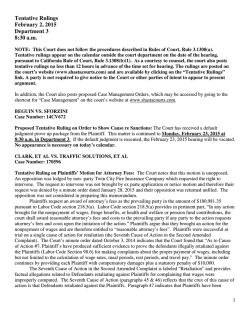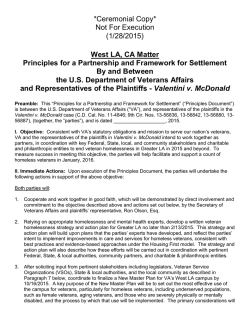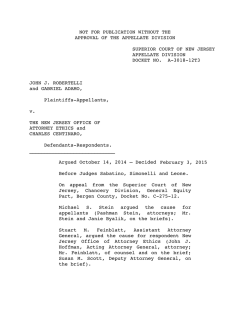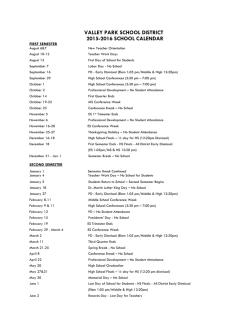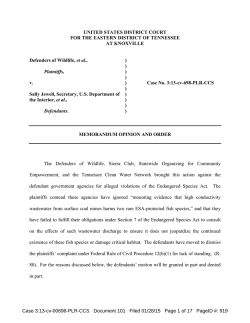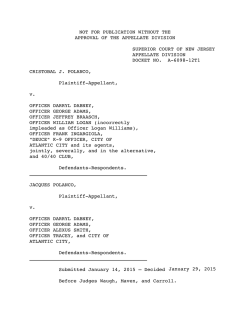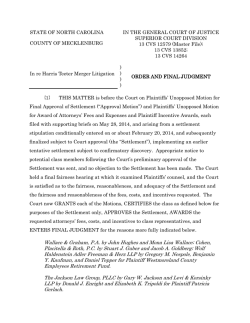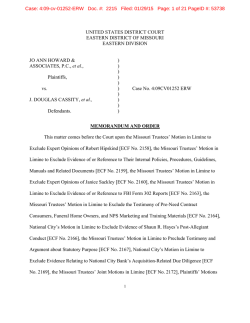
Unpublished 01/29/2015
STATE OF MICHIGAN COURT OF APPEALS REHABITAT SYSTEMS OF MICHIGAN, INC., CAROL A. BENCE, and DAMON R. HUFFMAN, UNPUBLISHED January 29, 2015 Plaintiffs/CounterdefendantsAppellees, v No. 317609 Genesee Circuit Court LC No. 13-100455-CK TAMMY ETHERLY, Defendant/CounterplaintiffAppellant. Before: MURPHY, P.J., and METER and SERVITTO, JJ. PER CURIAM. Defendant Tammy Etherly appeals as of right the trial court’s order that granted plaintiffs’ oral motion for voluntary dismissal of their complaint without prejudice, which motion was raised and granted at a hearing that was scheduled solely with respect to Etherly’s motion for summary disposition. The trial court’s order implicitly yet effectively dismissed a counterclaim filed by Etherly, although there was a question whether the counterclaim had ever been served on plaintiffs by Etherly, who acted as her own counsel below and continues to proceed pro per on appeal. We affirm. On May 20, 2013, plaintiffs Rehabitat Systems of Michigan, Inc. (Rehabitat), Carol A. Bence, and Damon R. Huffman filed a six-count complaint against Etherly, with Huffman, a licensed attorney, signing the complaint as attorney for plaintiffs. In the complaint, plaintiffs alleged that Rehabitat was in the business of providing services as a licensed adult foster care home for persons with traumatic brain injuries, specializing in the treatment of cognitively, physically, and mentally impaired adults. Plaintiff Bence was the president, treasurer, and a coowner of Rehabitat, and plaintiff-counselor Huffman was chairman of the board, vice-president, secretary, and also a co-owner of Rehabitat. Plaintiffs alleged that Etherly was a former at-will employee of Rehabitat; the at-will status being based on the language in an employee handbook. Plaintiffs maintained that, pursuant to the employee handbook, any disputes, controversies, or claims arising out of the employment relationship were contractually required to be submitted to the American Arbitration Association (AAA) for resolution. The record does contain an acknowledgment of agreement to arbitrate executed by Etherly. Plaintiffs alleged that Etherly violated the arbitration provision by filing a civil rights claim with the Michigan Civil Rights -1- Commission, which was ultimately rejected by an administrative law judge, and which caused plaintiffs to incur $5,960 in attorney fees in mounting a defense to the claim.1 Plaintiffs additionally asserted that Etherly disregarded the arbitration provision by filing a federal lawsuit against plaintiffs in the United States District Court for the Eastern District of Michigan (Southern Division), alleging civil rights violations and a claim under the Racketeer Influenced and Corrupt Organizations Act (RICO), 18 USC 1961 et seq.2 In plaintiffs’ complaint, they alleged that Etherly, in her federal lawsuit, falsely accused plaintiffs of unethical and unlawful conduct in regard to the termination of Etherly’s employment with Rehabitat. Plaintiffs asserted that Etherly’s accusations were made negligently and/or with actual malice, absent any privilege, prejudicing plaintiffs in the conduct of their business and deterring others from utilizing or engaging in business with Rehabitat. Plaintiffs alleged the following counts in their complaint against Etherly: malicious prosecution; abuse of process; defamation, slander, and libel; intentional infliction of emotional distress; breach of contract (damages for violation of arbitration provision); and breach of contract (specific performance of arbitration provision). On the same date that the complaint was filed, May 20, 2013, plaintiffs also filed and served on Etherly a request for admissions.3 On June 6, 2013, Etherly filed an answer to the complaint, affirmative defenses, a brief in support of her answer, and a counterclaim, alleging a hostile work environment, wrongful discharge and termination, civil conspiracy, breach of express and implied fiduciary, breach of express and implied good faith and fair dealing, breach of standard of care (negligence per se), negligence, and breach of covenant (promissory 1 Plaintiffs attached to the complaint a notice of disposition and order of dismissal issued by the Michigan Department of Civil Rights (MDCR) in regard to Etherly’s complaint, which provided: The investigation of this complaint included a review of all information obtained during the investigation. Based upon all the evidence in the file, e.g., any applicable statements of witnesses, analysis of comparatives and review of documents, the department determined that there is insufficient evidence to proceed. It is therefore ordered that this complaint is dismissed. The record also contains a dismissal from the United States Equal Employment Opportunity Commission (EEOC) regarding a claim filed by Etherly. The EEOC adopted the findings of the MDCR. 2 After Etherly filed her appeal with this Court, the federal district court granted a motion by defendants (our plaintiffs) to compel arbitration and dismissed the case “without prejudice to the parties’ right to move to re-open this case for entry of an arbitration award or for any other relief to which the parties may be entitled.” Etherly v Rehabitat Sys of Michigan, Inc, unreported opinion of the United States District Court, Eastern District of Michigan (Southern Division), issued June 6, 2014 (Docket No. 13-11360). 3 Attached to the request for admissions were pages from the employee handbook and six written warnings issued to Etherly by Rehabitat for company policy violations. -2- estoppel). At the very end of the consecutively paginated documents, Etherly included a certificate of service, indicating that she had served the documents by mail on plaintiff Huffman as attorney for plaintiffs. Subsequently, plaintiffs apparently sought entry of default on the basis that Etherly had not answered the complaint. We say “apparently” because, while the record does not contain a request or affidavit for default or entry of default, Etherly filed a document on June 17, 2013, coined a response to plaintiffs’ entry of default. Etherly claimed that she “served [p]laintiffs an [a]nswer on June 6, 2013, as evidenced in exhibit 1.” Exhibit 1 was a United States Postal Service “Certificate of Mailing” from Etherly to plaintiff Huffman, who, again, was acting as plaintiffs’ counsel. The certificate of mailing was simply a stub, showing Etherly’s address and Huffman’s address. There is no dispute that Etherly’s attempted manner of service was via certified mail. On July 10, 2013, Etherly filed a motion for summary disposition under MCR 2.116(C)(7) and (10), along with a brief in support of the motion, arguing that plaintiffs failed to timely respond to her counterclaim and that plaintiffs failed to timely respond to her own request for admissions. Etherly claimed that she had served the counterclaim and request for admissions on plaintiff Huffman. Attached to the brief in support of the motion for summary disposition was a request for admissions that was drafted by Etherly herself and, according to a certificate of service on the last page of the request, served on Huffman by US mail delivery on June 3, 2013. The brief also had attached a postal document indicating that Etherly had attempted service of the request for admissions on Huffman by certified mail, which document also stated as follows, “RETURN TO SENDER[,] UNCLAIMED[,] UNABLE TO FORWARD[,] RETURN TO SENDER.” With respect to her assertion that she had served the counterclaim on plaintiffs, Etherly attached another postal document that also reflected that a certified mailing had been returned to sender as unclaimed.4 There is no dispute that Etherly attempted service of the counterclaim and request for admissions by certified mail and that the mailings were returned to sender as unclaimed. Etherly’s motion for summary disposition was scheduled for July 22, 2013. On July 19, 2013, a stipulation and order was entered for substitution of counsel, with plaintiff Huffman stepping aside as plaintiffs’ attorney and being replaced by the Williams Firm, P.C. The hearing on Etherly’s motion for summary disposition was adjourned to July 29, 2013. And on July 25, 2013, plaintiffs filed a brief in response to Etherly’s motion for summary disposition. Plaintiffs argued that Etherly never properly served the counterclaim or the request for admissions on plaintiffs. Plaintiffs denied ever receiving the documents. On July 29, 2013, at the hearing on Etherly’s motion for summary disposition, plaintiffs’ counsel immediately interjected, stating that there was a preliminary issue that needed to be addressed. Plaintiffs’ counsel indicated that she had drafted a stipulation and order for a voluntary dismissal of plaintiffs’ complaint, but Etherly had refused to sign it, demanding some 4 Etherly did not mention or attach her certificate of service which had been part of the earlier filings that encompassed the answer, affirmative defenses, and counterclaim. -3- compensation in return for her execution of the stipulation.5 Plaintiffs’ counsel, who conceded that she had not filed a motion on the matter, asked the trial court to allow the dismissal of plaintiffs’ case. Etherly objected to the dismissal, absent any elaboration. The trial court proceeded to order dismissal, signing the order that had been part of the proposed stipulation and order prepared by plaintiffs that Etherly had refused to execute. The order provided “that the above matter is dismissed, in its entirety, without prejudice, and without costs as to either party.” The subject of Etherly’s motion for summary disposition and her counterclaim was never broached at the hearing, which lasted all of three minutes. On appeal, Etherly argues that the trial court clerk erred by not entering a default against plaintiffs for failure to answer Etherly’s counterclaim, that the trial court erred in granting plaintiffs’ motion to voluntarily dismiss their complaint, that the trial court erred by not hearing or deciding the merits of Etherly’s motion for summary disposition, and that the trial court erred in not hearing the merits of her motion to compel.6 We shall address below each of these arguments. The gist of this case concerns the interpretation and application of the court rules, which we review de novo on appeal. In re Mason, 486 Mich 142, 152; 782 NW2d 747 (2010); Estes v Titus, 481 Mich 573, 578-579; 751 NW2d 493 (2008). “A motion to grant voluntary dismissal made by the plaintiff is addressed to the sound discretion of the trial court and will not be reversed absent an abuse of discretion.” Mleczko v Stan’s Trucking, Inc, 193 Mich App 154, 155; 484 NW2d 5 (1992). In general, “an abuse of discretion occurs only when the trial court's decision is outside the range of reasonable and principled outcomes.” Saffian v Simmons, 477 Mich 8, 12; 727 NW2d 132 (2007). We “will not set aside a grant or denial of a voluntary dismissal unless it can be said that the lower court’s action was without justification.” Mleczko, 193 Mich App at 155. First, with respect to Etherly’s argument that the trial court clerk erred by not entering a default against plaintiffs for failure to answer Etherly’s counterclaim, there is nothing in the record indicating or even remotely suggesting that Etherly pursued entry of a default with the clerk under the requirements of the applicable court rule, MCR 2.603(A). Under MCR 2.603(A)(1), “[i]f a party against whom a judgment for affirmative relief is sought has failed to plead or otherwise defend as provided by these rules, and that fact is made to appear by affidavit or otherwise, the clerk must enter the default of that party.” (Emphasis added.) Etherly did not submit a supporting affidavit, nor is there an indication that she submitted any document to the clerk for purposes of a default under MCR 2.603. There was no compliance with MCR 2.603. Accordingly, Etherly’s argument lacks merit. 5 Plaintiffs’ counsel also briefly touched on the subject of plaintiffs’ request for entry of a default relative to their complaint, with the trial court noting that Etherly had filed an answer and that pro pers often fail to realize that service must also be accomplished. 6 We are not clear what Etherly is referring to when speaking of her motion to compel. We cannot locate any such motion in the lower court record. -4- Furthermore, the service, or attempted service, of the counterclaim raises some concerns. Pursuant to MCR 2.110(B)(1), “[a] party must file and serve a responsive pleading to a complaint.” This provision would control and mandate the filing and service of an answer and affirmative defenses. MCR 2.107(A)(1), which addresses when service is required with respect to pleadings generally and other papers,7 provides that “[u]nless otherwise stated in this rule, every party who has filed a pleading, an appearance, or a motion must be served with a copy of every paper later filed in the action.” (Emphasis added.) This provision required Etherly to serve the counterclaim on plaintiffs. With respect to the manner of service, MCR 2.107 further provides in relevant part: (C) Service of a copy of a paper on an attorney must be made by delivery or by mailing to the attorney at his or her last known business address or, if the attorney does not have a business address, then to his or her last known residence address. Service on a party must be made by delivery or by mailing to the party at the address stated in the party's pleadings. ... (3) Mailing a copy under this rule means enclosing it in a sealed envelope with first class postage fully prepaid, addressed to the person to be served, and depositing the envelope and its contents in the United States mail. Service by mail is complete at the time of mailing. Etherly attempted to serve the counterclaim on plaintiffs by certified mail, not by ordinary, first-class mail as referenced in MCR 2.107(C)(3). Woods v SLB Prop Mgt, LLC, 277 Mich App 622, 626; 750 NW2d 228 (2008) (“service by first-class, ordinary mail is a proper manner of service under MCR 2.107[C]”). MCR 2.107(C)(3) makes no mention of the word “certified.”8 It was thus unnecessary for Etherly to send the counterclaim by certified mail, and the record does not contain any document showing that Huffman or plaintiffs signed for the mail. Indeed, examination of the very exhibit relied on by Etherly as showing service of the certified mailing reveals that it was returned to her as unclaimed. It would appear that Etherly did not obtain service by mail within the contemplation of MCR 2.107(C)(3).”9 But, interestingly, had 7 A “counterclaim” is a “pleading” under the court rules. MCR 2.110(A)(3). 8 Use of “registered or certified mail” is required with respect to serving a summons and complaint, assuming personal service is not employed. MCR 2.105(A). 9 We appreciate that Etherly’s use of certified mail was likely an effort on her part to exercise due care in seeing that the counterclaim reached plaintiffs, and we can only speculate as to why Huffman, acting as counsel for plaintiffs, did not sign for the certified mailing, assuming it reached him, but ultimately the mailing was not claimed and was instead returned to Etherly. Had Etherly simply mailed the counterclaim to Huffman by ordinary, first-class mail, no service issue would likely have arisen. We do note that the certified mailing did contain the correct address of plaintiff Huffman, as identified in the paperwork Huffman filed with the trial court as counsel for plaintiffs. -5- Huffman signed for the certified mail, it would seem axiomatic that service would have been effectively accomplished, despite the fact that service by certified mail is not envisioned under MCR 2.107(C)(3). Ultimately, while service of the counterclaim appears problematic, we decline to hinge our decision to affirm on the service issue, as the other reasons set forth in this opinion are sufficient to affirm the trial court’s ruling. For her second argument on appeal, Etherly contends that the trial court erred in granting plaintiffs’ motion to voluntarily dismiss their complaint. Etherly argues that plaintiffs failed to timely answer the counterclaim and her request for admissions, thereby conclusively establishing all of the allegations in the counterclaim and all of the requested admissions, which in turn militated against granting a voluntary dismissal, as plaintiffs should have been subject to an adverse determination with prejudice. MCR 2.504(A) concerns the voluntary dismissal of a plaintiff’s complaint, providing as follows: (1) Subject to the provisions of MCR 2.420 and MCR 3.501(E) [inapplicable], an action may be dismissed by the plaintiff without an order of the court and on the payment of costs (a) by filing a notice of dismissal before service by the adverse party of an answer or of a motion under MCR 2.116, whichever first occurs; or (b) by filing a stipulation of dismissal signed by all the parties. Unless otherwise stated in the notice of dismissal or stipulation, the dismissal is without prejudice . . . . (2) Except as provided in subrule (A)(1), an action may not be dismissed at the plaintiff's request except by order of the court on terms and conditions the court deems proper. (a) If a defendant has pleaded a counterclaim before being served with the plaintiff's motion to dismiss, the court shall not dismiss the action over the defendant's objection unless the counterclaim can remain pending for independent adjudication by the court. (b) Unless the order specifies otherwise, a dismissal under subrule (A)(2) is without prejudice. A voluntary dismissal under MCR 2.504(A)(1) was not accomplished, so subsection (A)(2) necessarily served as the basis for the trial court’s ruling. In her chief appellate brief, Etherly completely fails to refer to or present any argument under MCR 2.504, let alone subsection (A)(2)(a) and the role of counterclaims in deciding whether to grant a request for voluntary dismissal. Accordingly, we need not address MCR 2.504(A)(2)(a). That said, we do believe that, based on the nature of the allegations, Etherly’s counterclaim could have remained pending for independent adjudication even with dismissal of plaintiffs’ lawsuit, thereby allowing for a voluntary dismissal under MCR 2.504(A)(2)(a). Even with that conclusion, we find it -6- unnecessary to reverse the dismissal of Etherly’s counterclaim for the reasons discussed at the end of this opinion. The heart of Etherly’s argument is that the trial court abused its discretion in granting the request for voluntary dismissal because she was entitled to summary disposition with prejudice on the basis of her position that plaintiffs failed to respond to the counterclaim and request for admissions. This Court has indicated that a request for voluntary dismissal without prejudice should not be granted if a defendant was entitled to summary disposition on the merits and with prejudice, thereby obtaining the protection from a future suit under the doctrine of res judicata. McLean v McElhaney, 269 Mich App 196, 202-203; 711 NW2d 775 (2005), rev’d on other grounds 480 Mich 978 (2007); Rosselott v Muskegon Co, 123 Mich App 361, 375-376; 333 NW2d 282 (1983). We do note, once again, our concerns regarding the service of the counterclaim, which concerns would apply equally to service of the request for admissions that was sent by certified mail and returned as unclaimed. Regardless, MCR 2.312(F) provides that a request for admissions “must be filed with the court either before service or within a reasonable time thereafter.” Etherly claimed to have served plaintiffs with the request for admissions on June 3, 2013.10 Etherly’s request for admissions were filed with the trial court on July 10, 2013, as an attachment to her motion for summary disposition. The five-week delay between any presumed service and the filing was not reasonable. Furthermore, and setting aside the service issues, we cannot conclude that Etherly was entitled to summary disposition, given the procedural posture and circumstances of the case. If indeed plaintiffs defaulted with respect to the counterclaim, the applicable default procedures in MCR 2.603 had to be implemented, which included giving plaintiffs an opportunity to set aside the default; Etherly was not entitled to an automatic order of summary disposition under MCR 2.116(C). With respect to the request for admissions, MCR 2.312 does provide, in relevant part: (B)(1) Each matter as to which a request is made is deemed admitted unless, within 28 days after service of the request, or within a shorter or longer time as the court may allow, the party to whom the request is directed serves on the party requesting the admission a written answer or objection addressed to the matter. ... (D)(1) A matter admitted under this rule is conclusively established unless the court on motion permits withdrawal or amendment of an admission. For good cause the court may allow a party to amend or withdraw an admission. The court may condition amendment or withdrawal of the admission on terms that are just. 10 We note that Etherly had not filed her answer, affirmative defenses, brief in support of answer, and counterclaim until June 6, 2013, meaning that she allegedly served the request for admissions before otherwise appearing in the lawsuit. -7- Accordingly, there is a process that can be utilized to challenge a deemed admission, allowing for an opportunity to avoid the consequences of an admission based on good cause. Etherly was not instantly entitled to an order of summary disposition under MCR 2.116(C). In Janczyk v Davis, 125 Mich App 683, 691; 337 NW2d 272 (1983), this Court explained: [T]he failure to properly answer the requests for admissions does not mean that the trial judge must automatically enter summary judgment even if (as here) the admissions cover the entire suit. The trial judge has the discretion to allow the party to file late answers or even to amend or withdraw the answers. Moreover, in her summary disposition motion and brief, Etherly made no attempt whatsoever to correlate the “admissions” with the elements of the causes of action raised by plaintiffs and by Etherly in her counterclaim. In sum, procedures under the court rules were not followed by Etherly. And we hold that the trial court did not abuse its discretion in granting plaintiffs’ request for voluntary dismissal of their complaint without prejudice. Etherly next argues that the trial court erred by not hearing or deciding the merits of her motion for summary disposition. Etherly maintains that the court erred by failing to make findings of fact and conclusions of law under MCR 2.517. First, MCR 2.517 is not applicable, given that it concerns “actions tried on the facts without a jury,” MCR 2.517(A)(1), which would encompass bench trials and evidentiary hearings and not motions for summary disposition. We do opine that the trial court should have at least permitted Etherly some opportunity to argue her summary disposition motion, especially considering that a hearing was scheduled on the motion and that plaintiffs raised the issue of a voluntary dismissal without formally filing any motion and noticing it for a hearing.11 However, “[a] court may, in its discretion, dispense with . . . oral arguments on motions[.]” MCR 2.119(E)(3). Regardless, given the appropriateness of the voluntary dismissal, the service concerns, the procedural failures relative to the proper course of action applicable to defaults and unanswered admission requests, and the inadequate briefing in her summary disposition brief, all as alluded to above, we find no sound legal basis to reverse on the ground that the trial court should have heard and decided the merits of Etherly’s motion for summary disposition. Finally, Etherly argues that the trial court erred in not hearing the merits of her motion to compel. As indicated earlier, we cannot locate any motion to compel in the record, and Etherly’s argument on the issue is cursory and provides no enlightenment regarding the nature of any motion to compel. In Mudge v Macomb Co, 458 Mich 87, 105; 580 NW2d 845 (1998), our Supreme Court observed: “It is not enough for an appellant in his brief simply to announce a position or assert an error and then leave it up to this Court to discover and rationalize the basis for his claims, or unravel and elaborate for him his arguments, and then search for authority either to sustain or reject his position. The appellant himself must first adequately prime the pump; only then does the appellate well begin to flow.” [Citation omitted.] 11 Etherly raises no appellate issues or arguments on the matter. -8- Accordingly, we conclude that Etherly waived any issue in regard to a motion to compel, assuming such a motion even existed in the first place. We do wish to touch on one final matter, which is the dismissal of Etherly’s counterclaim. Although she argues that she was entitled to summary disposition on the counterclaim, which we rejected above, Etherly does not specifically argue that the trial court erred in actually dismissing the counterclaim. Plaintiffs posit that there effectively was no counterclaim to dismiss given the failure of service. As noted earlier, we do believe that the counterclaim could have stood on its own, given the nature of the allegations, independent from the allegations in plaintiffs’ complaint, which thus permitted dismissal of plaintiffs’ complaint for purposes of MCR 2.504(A)(2)(a). Of course, the counterclaim was also dismissed. However, because Etherly does not particularly argue that dismissal of the counterclaim constituted error and because any assumed viable counterclaim was necessarily dismissed without prejudice, allowing for a new filing should Etherly decide to so proceed,12 we see no sound, rational basis to reverse the dismissal of Etherly’s counterclaim. Our concerns regarding service of the counterclaim also weigh in favor of upholding dismissal of the counterclaim. Affirmed. Having fully prevailed on appeal, plaintiffs are awarded taxable costs pursuant to MCR 7.219. /s/ William B. Murphy /s/ Patrick M. Meter /s/ Deborah A. Servitto 12 Given the federal court’s ruling, it would appear that any new state court action filed by Etherly premised on the allegations in her counterclaim would not survive; however, it is unnecessary and would be improper for us to decide that matter. -9-
© Copyright 2026
